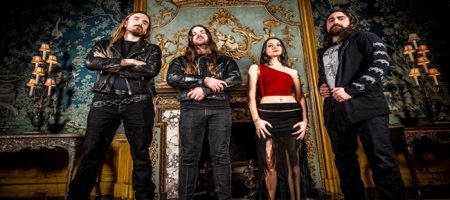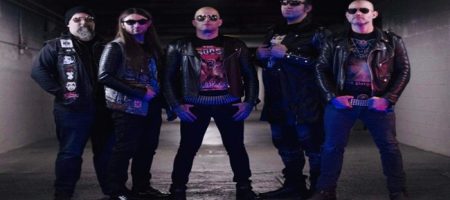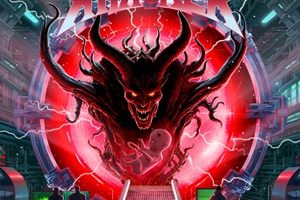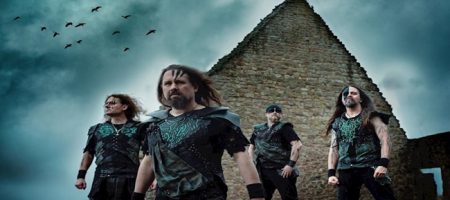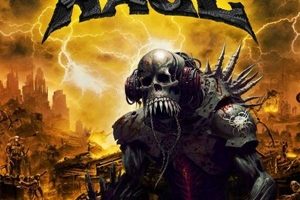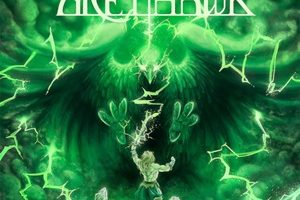Mystic Prophecy – Fiery Demons
Sunday, 7th May 2023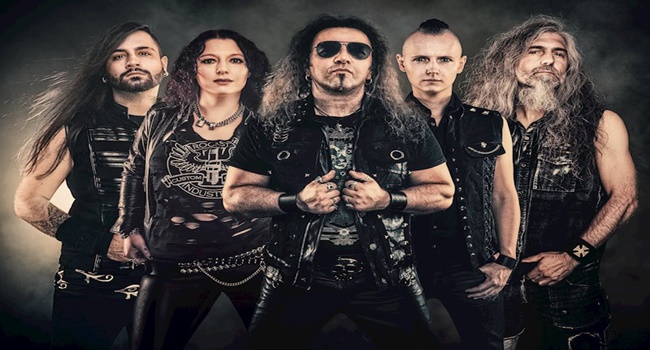
Twenty-three years strong as a power metal force with aspects of speed, thrash, and traditional nuances at play, Mystic Prophecy are a proven, reliable entity when it comes to longevity, consistency, and work ethic. Gus G was a part of the band in its infancy, the band moving forward to release strong albums like Savage Souls, Killhammer, and Metal Division. Their eleventh studio album Hellriot is another steamroller, tightly focused on sharp riffs, memorable vocals, and versatile songwriting that hopefully develops a future mandatory anthem or two for the faithful following.
We were able to talk to guitarist Markus Pohl on a host of topics – including the longer time period to work on the new record, video shoots, favorite firsts within the band’s history, challenges coming back to the live show front out of the pandemic, and how the next year will shape up for activities.
Dead Rhetoric: Hellriot is the eleventh studio album for Mystic Prophecy. How did the songwriting and recording sessions go for this set of material – and did the pandemic allow the band to refine the material and dig deeper into the details more than ever before?
Markus Pohl: Exactly. We just started because we had enough time. Everybody has their own studio to work with. We just started to record everybody by themselves. With the internet it’s easy to put everything onto a network, we can listen to everything. We had enough time to rebuild the songs, to work on the vocals, to come back to the guitars and drums. Even when we were in the recording process, we still had enough time. We worked on this album for almost two years – and I hope you can hear that.
Dead Rhetoric: Definitely. It feels like you made a focused effort this time. Where do you see this record sitting in the catalog versus the previous albums for Mystic Prophecy?
Pohl: You need to take care that things aren’t going to be too smooth. We need a little bit of roughness in our music, you need to step back again. Compared to the other (albums), we have some more influences from the two younger guys in our lineup – Hanno (Kerstan) the drummer and Evan K our second guitar player. They bring a lot of new influences – they often show up and ask us to listen to this new band I’ve never heard of. And then I go on YouTube and these bands have a million clicks, that’s cool. These are the new influences – I have been searching for something new for myself. I’ve been listening to a lot of American bands, Bradley Gilbert, these new influences, you can hear them a little bit on the new album.
Dead Rhetoric: What did you think of Evan K as the newer guitarist, being younger and how you’ve dealt with different guitarists over the years? What does Evan bring style-wise that is fresher for the band?
Pohl: Every guitar player we have had within Mystic Prophecy shreds and is ten times better than me. I didn’t care about that. I want a fat sound out of my work. The most important thing, Evan has studied the instrument and knows a lot of theory. I will play something, and he will say it’s an F7 chord, or F minor. I didn’t know it, I just play. He focuses on every note. I can learn a lot about music, and relearn everything through him. There was a time where I knew everything, but you grow older and it’s harder to take care of that stuff. He brings a new energy, new sounds, he’s totally different. He plays original stuff, and after experiences he has found a really good sound.
Dead Rhetoric: Tell us about the making of the video for the title track produced and directed by Frank Kollbrunner – as it’s got quite a cinematic, throwback presence that intertwines with the band performance footage?
Pohl: That was really cool. I was just there when we recorded our band footage. The actors had a lot of fun, but I heard it was really, really cold. It was the first time we’ve worked with Frank, and we worked in Switzerland. It was a scary, industrial area where we recorded it, and everything was there. He’s a good photographer, he knew where to position people and he knew how to film them because it’s harder to take a photo, it’s one moment. If you move, you support the picture. He’s got a good eye for that. We are all not professional actors, and they aren’t as well. You can see the girls had a lot of fun, and they had good support. They did this makeup thing, it helped a lot, that was Frank’s girlfriend that helped with this. They all knew each other, it was coming home, having a good time with friends and making the video. I should have been there for that.
Dead Rhetoric: Is it tough to decide what songs to preview or premiere for the representation of the full-length this deep into your career?
Pohl: Of course, always. You always choose the wrong one. You will never know if it’s the wrong one or not. You just go for your feelings, you listen to all the songs, it doesn’t need to be the best song. It needs to be the easiest song, that can fit with a video. You need the idea for a video, and “Hellriot” was the perfect song. We have three more videos that we will be rolling out, look forward!
Dead Rhetoric: Serbian artist Dušan Marković did the cover art for Hellriot – who previously worked with the band on the Monuments Uncovered record a few years back. What do you enjoy most about his style, what he provides for the band, and where do you see the importance of cover art these days setting the proper tone as far as what listeners can expect when pressing play?
Pohl: First of all, Lia knows everything about the cover. He has in his mind where he wants the cover to go, and he puts everything together. Let’s do this song, and he puts together with different motives. This sword for a shirt, this cross for a girlie shirt, you know – even he thought about making the head of the devil for a bag. And then he puts everything together – he just draws a little bit, but it’s not a real drawing. He brings these totally cool covers – the importance of the covers, I don’t know how it is in America, but in Europe we sell more vinyl than CD’s. It counts big, the big covers, nice vinyl covers – or digitally, have it like a desktop. So cover art is coming back in importance. That’s a good move. The CD was good when you could take it into your car, play it. Today you have Spotify, and you can breathe more to play it on vinyl.
Dead Rhetoric: When you are this deep into a band’s career, which do you think is harder to satisfy – continually striving to take your style into new territory to remain fresh and relevant, or keeping your established fanbase happy and satisfied through each successive record you make?
Pohl: We never thought about that. Everybody develops and evolves anyway. The fans are cool with us. We may get older, but we still have younger fans too. The young fans know the newer albums even more than the old albums. We just don’t want to make more of the same with this album that we’ve made on the other albums. We will sound like Mystic Prophecy all the way up. It’s very interesting to listen to the first albums and then the next albums, you can see the time lapse and how the band has evolved.
Dead Rhetoric: What do you consider some of the biggest challenges facing Mystic Prophecy at this point in your career?
Pohl: Getting live shows. You need to be able to afford them. It’s really expensive, night liners are expensive, the clubs make shitty deals that I can’t understand. It’s a high risk to go on tour. The second, there are a lot of people that aren’t here anymore. Mixing guys and everybody. During the pandemic, they had to search for another job, and they aren’t here anymore. Now these are hard times for bands.
Dead Rhetoric: When looking at your lengthy musical career, what do you consider some of the highlights in terms of albums, live shows, festival appearances, or special travel experiences that will stay forever embedded in the memory banks?
Pohl: It’s always the first times. Playing for the first time at Wacken, the first time at Summer Breeze, first time you are in a night liner. These are the steps you will remember. The first time being at a big festival, the first time playing with Gus G, he could do this on the guitar. When I saw him live, he could do this for real. These are the points that are really good. If you play in another country, 4000 miles away that they still listen to your music, it’s a great thing for your self-esteem.
Dead Rhetoric: You have been a part of the Rock of Angels Records roster now for a few years. Where do you see the major differences in terms of their staff, promotion, and understanding of Mystic Prophecy compared to your lengthy time with Massacre Records?
Pohl: First of all, they are Greek. So, our singer and other guitar player, they are Greek too and it’s really nice. They have a special kind of relationship. For me, I’m not into all this business stuff. We are one of the bigger bands on Rock of Angels Records, so somehow, we can do more of what we want. It’s easier to get things. On the other hand, Massacre got sold and we had no other choice. We are still friends with the guys at Massacre, no beef or nothing.
Dead Rhetoric: How difficult of a process is it to make a setlist even in a headlining situation now with over eleven studio albums to choose from? And how would you describe Mystic Prophecy when it comes to your live performances/outlook compared to what listeners hear on record – do you find an equal amount of satisfaction with both aspects of the band, or do you prefer one over the other?
Pohl: That’s really hard. On the upcoming tour, we are going to play four new songs. It was really hard to release some of the other songs from the setlist. You make a mixture of what you like to play and what you know the audience likes to hear. When we rehearse, we practice even more songs so if one song doesn’t work, we switch it out and replace it with another one. Sometimes you are on tour with a harder band, so you need harder songs. If you release a song for the setlist, it’s only for the moment. Every show is new.
I like to write songs, the creative process. I hate to record it, it seems like a day job recording the tracks. I love to be on stage, way more energy and you can play a little rougher. It comes from the bottom of your heart. If you make a mistake, perhaps it makes it even better. I prefer being on stage and being on tour.
Dead Rhetoric: How would you describe the current band chemistry for Mystic Prophecy? When it comes to setbacks, missteps, or failures, how do the members handle things internally to come back stronger in the end?
Pohl: Everybody makes mistakes, we laugh about it and it’s not a big problem. We have had this lineup for some years, we have changed members from time to time. It feels like the crew is together now. It’s cool on stage if I miss a hit because the others know how to handle it.
Dead Rhetoric: How would you assess the state of heavy metal within mainland Europe these days? Are there specific countries or continents that you would like to tour or extend your reach a little more – including North America as an example?
Pohl: Yeah, North America would be nice. I like being in America, for me it’s like coming home. We barely could afford the tours here in Europe, so money is really an issue right now. Everything is expensive, you need the documents and the paperwork to go there. That costs money and time. You fly over, you need to rent a backline, the costs are even higher. We cannot afford a real tour, maybe we can play some festivals. You are there, the stage is ready, you bring the guitar/cables, that’s it. In Europe, we have played everywhere and we love to play there. We have booked a lot of festival shows, one little tour in May, release shows. Looking forward to doing that. South America would be nice.
Dead Rhetoric: What worries do you have about the world that we live in today? Where do you think the average person needs to spend more time and energy on to make the overall well-being of their community or country that much better?
Pohl: Times change. I don’t know where we are going to go. We have this issue; we talk about it in one of our songs “Rising with the Storm”. It’s about the anti-Christ, the Bible talks about him, but we aren’t sure if the anti-Christ is still here. We talk about this in the song. If you change too fast, nobody will follow. We still need to live; you can’t break everything down and make it new. The next years – let’s see what happens.
Dead Rhetoric: What’s on the horizon for activities, touring, promotion, etc. for Mystic Prophecy over the next twelve months or so?
Pohl: Right now, sometimes I play for Powerwolf. They ask me to do some tracks, it’s an honor for me to play with them as they are really great guys. On the other hand, I don’t do other jobs because Mystic Prophecy and Powerwolf take up so much of my time. We all have day jobs too. Working twelve hours, then coming home to a studio to do interviews, writing songs, working on anything else, you have to take care of your equipment. We will go on tour soon, that needs time – it’s better to concentrate a bit. The fans will see us, come to our shows.











